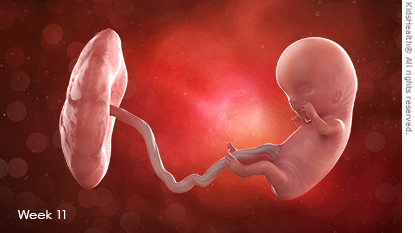Pregnancy at 11 Weeks: Weekly Calendar
Your Baby's Development at 11 Weeks
What Are My Baby’s Weight and Size at 11 Weeks?
Your baby at 11 weeks is about the size of a golf ball or ping-pong ball, which is just over 1 ½ inches. Your baby weighs about 1.6 ounces (45.93 grams).
For the next several weeks, your baby will continue to grow rapidly. To handle all this growth, the blood vessels in the placenta are growing in both size and number to provide your baby with more nutrients.
Development Milestones at 11 Weeks
You won’t be able to feel it yet, but your baby is starting to make movements in the womb, like closing little fists and opening and closing the mouth. Bones are forming, too, and skin is see-through. Facial development continues as the ears move toward their final position on the sides of the head. If you saw a picture of your baby now, you'd think you had a genius on your hands — your baby's head accounts for about half of the body length!
Although your baby's reproductive organs are developing rapidly, the external genitals of boys and girls appear somewhat similar until the end of week 11. They will be easier to tell apart on ultrasound by about 18 to 22 weeks.

Your Body When You’re 11 Weeks Pregnant
Pregnancy Symptoms at 11 Weeks
By week 11 in pregnancy, you may be feeling bloated or full. This happens because your body digests food more slowly, so it has more time to absorb nutrients from the food you eat.
Nourishing your baby usually requires that you gain weight. In most cases, the recommended weight gain is 25 to 35 pounds (11.33 to 15.87 kg) over the course of a pregnancy. If you were overweight or underweight before pregnancy, your health care provider may have different recommendations for weight gain.
At this stage, it’s normal to have:
- tender or swollen breasts
- bloating and gas
- “morning sickness” — which can happen at any time of the day or night, causing nausea and vomiting
- fatigue (extreme tiredness)
- peeing more often
Discuss how to best manage your symptoms, and any other concerns you have, with your health care provider.
What Can I Expect at My First Prenatal Visit?
If you have not already scheduled your first prenatal visit, you will want to do that this week, or as soon as possible.
At your first prenatal visit, the doctor or nurse practitioner will confirm that you’re pregnant and estimate your due date (when your baby might be born). This date is based on when you had your last period. Sometimes a prenatal ultrasound (a test that uses sound waves to make a picture of your baby) can help figure out the due date.
The doctor will do a physical exam to check your health and may want to do prenatal tests. Prenatal tests check your health and your baby’s health. Some are screening tests that can only show the chance of a problem. Others are diagnostic tests that can find out if your baby has a certain problem.
While you’re pregnant, prenatal lab work — like blood tests— is offered during the first trimester (weeks 1–12), second trimester (weeks 13–27), and third trimester (weeks 28–40).
At your first appointment, the doctor also will:
- discuss your health history
- discuss prenatal vitamins, lifestyle, and nutrition recommendations
- establish a prenatal care plan
- address questions and concerns
First Trimester Screening Test
Your health care provider may offer you a first trimester screening test. The screening helps look for any problems your baby may have with chromosomes (tiny strands inside cells that carry genes), like Down syndrome, or birth defects, like heart problems. An abnormal result does not necessarily mean that your baby has a condition — but more testing might be needed. Talk to your health care provider about the risks and advantages of this test.


 Note: All information is for educational purposes only. For specific medical advice,
diagnoses, and treatment, consult your doctor.
Note: All information is for educational purposes only. For specific medical advice,
diagnoses, and treatment, consult your doctor.